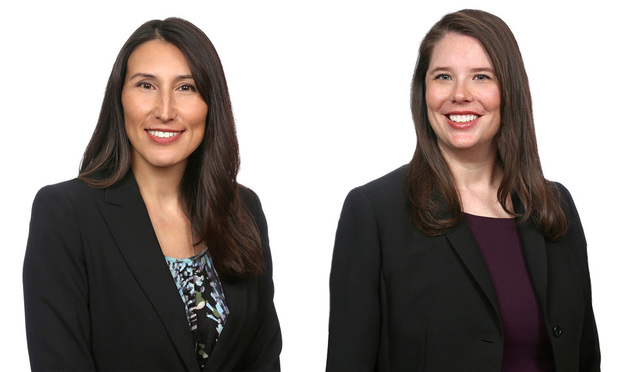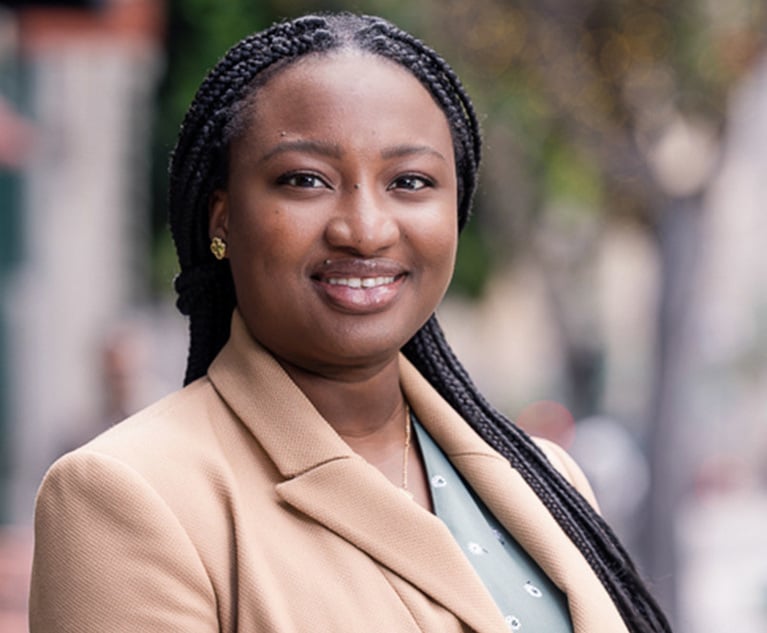Key Considerations When Responding to Media Inquiries
Attorneys distracted by the allure of press coverage may not always appreciate the risks associated with discussing a case with the media.
May 07, 2019 at 07:23 PM
6 minute read
 Shari Klevens, left, and Alanna Clair, Dentons. Courtesy photo
Shari Klevens, left, and Alanna Clair, Dentons. Courtesy photo
Attorneys are not known for being bashful. Thus, when the media comes calling about a particular client representation, some attorneys cannot help but put on a “show” that might include, for example, expressing dismay at the opposing party's actions or even a bit of self-promotion. Moreover, in today's world, contact with the media is not limited to a small group of attorneys handling high-profile cases. Instead, given the ease in accessing filed documents online and the wide range of legal publications, attorneys with all types of practices may find themselves receiving a call from a reporter when a case piques the public interest for whatever reason.
However, attorneys distracted by the allure of press coverage may not always appreciate the risks associated with discussing a case with the media. Indeed, in the heat of the moment, unwary attorneys could make statements that are inconsistent with the client's wishes or that violate confidentiality obligations. Below are some tips for attorneys to avoid common pitfalls when responding to media inquiries.
Consider the Client
The decision regarding whether to discuss a case with the media, and what to disclose to the media, can be like any other strategy decision during the course of a representation. Thus, as with other key decisions, attorneys typically will not unilaterally agree to talk to the media without first obtaining client authorization. Some larger clients that are regularly involved in high-profile litigation may in fact have express policies precluding statements to the media without prior consent, choosing instead to have an in-house public relations team handle all media inquiries.
The California Rules of Professional Conduct also provide some guidance. For example, under Rule 1.4(a)(2), attorneys are required to “reasonably consult with the client about the means by which to accomplish the client's objectives in the representation.”
Consider Potential Prejudice
Besides the client's wishes, attorneys may also need to consider the impact of a statement to the media on the case at issue. Rule 3.6 of the California Rules of Professional Conduct, titled “Trial Publicity,” contains a number of provisions governing the information that attorneys may disclose publicly regarding a matter.
In particular, Rule 3.6(a) prohibits an attorney from making “an extrajudicial statement that the lawyer knows or reasonably should know will (i) be disseminated by means of public communication and (ii) have a substantial likelihood of materially prejudicing an adjudicative proceeding in the matter.” The comments to the rule provide a list of factors to consider in determining whether a statement is prohibited including, for example, “whether the extrajudicial statement presents information clearly inadmissible as evidence in the matter for the purpose of proving or disproving a material fact in issue.”
The application of this rule can give rise to some thorny issues, including in distinguishing between statements that might impact the right to a fair trial and statements that are properly disclosed as part of the right of free expression and the right of the public to receive information on matters affecting the public interest. Accordingly, attorneys can carefully consider whether any statements might be construed as going too far.
Fortunately, Rule 3.4(b) does specify statements that are permitted, subject to an attorney's duty to maintain client confidences. These include statements regarding, among other information, the claim, offense, or defense involved, information contained within a public record, a warning of danger to the public where there is a likelihood of substantial harm, or a statement that an investigation is ongoing.
Protecting the Client's Interests
There are some instances where statements that might otherwise violate Rule 3.6(a) may be permitted. These essentially come down to a question of “who started it.” Indeed, even if an attorney is generally prohibited from making certain statements to the press, “a lawyer may make a statement that a reasonable lawyer would believe is required to protect a client from the substantial undue prejudicial effect of recent publicity not initiated by the lawyer.” Rule 3.6(c).
However, the ability to make such disclosures is “limited to such information as is necessary to mitigate the recent adverse publicity.” Thus, attorneys may be able to make statements that would otherwise not be permitted by Rule 3.6(a) if those statements are narrowly aimed at rebuttal. The key is to determine whether the statements would in fact address the prejudicial effect on the client.
Internal Firm Policies
In addition to checking with the client, many attorneys facing media inquiries for their matters may choose to discuss their options internally before making a comment. Some law firms have media policies in place or even internal public relations personnel to help attorneys navigate the media. Separately, attorneys may find that they benefit from additional minds weighing in on the strategy and approach to media discussions to help ensure both ethical compliance and that the firm is best serving the client's needs.
Moreover, in situations where an attorney is asked for general comments on an unrelated case, an attorney may want to discuss internally to avoid inadvertently commenting on issues in a manner that is unfavorable to other firm clients.
Be Aware of the Rules
In some situations, the court or judge may have a standing order addressing public statements to the media. Thus, attorneys would be well-served by making sure that they are not at risk of being called to chambers over their extrajudicial statements. Further, if disclosing information might violate a gag or other order, the attorney may be sanctioned by the court or the bar for making public statements—even if the attorney's statements otherwise comply with the rules of professional conduct in the absence of a gag order.
Thus, while attorneys may like to see their name in the media associated with a high-profile case, a wide range of considerations are necessary in order to determine whether talking to the media is in the best interests of the client and complies with the applicable rules.
Shari L. Klevens is a partner at Dentons US and serves on the firm's US Board of Directors. She represents and advises lawyers and insurers on complex claims, is co-chair of Dentons' global insurance sector team, and is co-author of “California Legal Malpractice Law” (2014). Alanna Clair is a partner at Dentons US and focuses on professional liability defense. Shari and Alanna are co-authors of “The Lawyer's Handbook: Ethics Compliance and Claim Avoidance.”
This content has been archived. It is available through our partners, LexisNexis® and Bloomberg Law.
To view this content, please continue to their sites.
Not a Lexis Subscriber?
Subscribe Now
Not a Bloomberg Law Subscriber?
Subscribe Now
NOT FOR REPRINT
© 2025 ALM Global, LLC, All Rights Reserved. Request academic re-use from www.copyright.com. All other uses, submit a request to [email protected]. For more information visit Asset & Logo Licensing.
You Might Like
View All
California’s Workplace Violence Laws: Protecting Victims’ Rights in the Workplace
6 minute read

'Nothing Is Good for the Consumer Right Now': Experts Weigh Benefits, Drawbacks of Updated Real Estate Commission Policies

FTC Issues Final Rule Banning Most Noncompetes, but Immediate Legal Challenges Ensue
6 minute readTrending Stories
Who Got The Work
Michael G. Bongiorno, Andrew Scott Dulberg and Elizabeth E. Driscoll from Wilmer Cutler Pickering Hale and Dorr have stepped in to represent Symbotic Inc., an A.I.-enabled technology platform that focuses on increasing supply chain efficiency, and other defendants in a pending shareholder derivative lawsuit. The case, filed Oct. 2 in Massachusetts District Court by the Brown Law Firm on behalf of Stephen Austen, accuses certain officers and directors of misleading investors in regard to Symbotic's potential for margin growth by failing to disclose that the company was not equipped to timely deploy its systems or manage expenses through project delays. The case, assigned to U.S. District Judge Nathaniel M. Gorton, is 1:24-cv-12522, Austen v. Cohen et al.
Who Got The Work
Edmund Polubinski and Marie Killmond of Davis Polk & Wardwell have entered appearances for data platform software development company MongoDB and other defendants in a pending shareholder derivative lawsuit. The action, filed Oct. 7 in New York Southern District Court by the Brown Law Firm, accuses the company's directors and/or officers of falsely expressing confidence in the company’s restructuring of its sales incentive plan and downplaying the severity of decreases in its upfront commitments. The case is 1:24-cv-07594, Roy v. Ittycheria et al.
Who Got The Work
Amy O. Bruchs and Kurt F. Ellison of Michael Best & Friedrich have entered appearances for Epic Systems Corp. in a pending employment discrimination lawsuit. The suit was filed Sept. 7 in Wisconsin Western District Court by Levine Eisberner LLC and Siri & Glimstad on behalf of a project manager who claims that he was wrongfully terminated after applying for a religious exemption to the defendant's COVID-19 vaccine mandate. The case, assigned to U.S. Magistrate Judge Anita Marie Boor, is 3:24-cv-00630, Secker, Nathan v. Epic Systems Corporation.
Who Got The Work
David X. Sullivan, Thomas J. Finn and Gregory A. Hall from McCarter & English have entered appearances for Sunrun Installation Services in a pending civil rights lawsuit. The complaint was filed Sept. 4 in Connecticut District Court by attorney Robert M. Berke on behalf of former employee George Edward Steins, who was arrested and charged with employing an unregistered home improvement salesperson. The complaint alleges that had Sunrun informed the Connecticut Department of Consumer Protection that the plaintiff's employment had ended in 2017 and that he no longer held Sunrun's home improvement contractor license, he would not have been hit with charges, which were dismissed in May 2024. The case, assigned to U.S. District Judge Jeffrey A. Meyer, is 3:24-cv-01423, Steins v. Sunrun, Inc. et al.
Who Got The Work
Greenberg Traurig shareholder Joshua L. Raskin has entered an appearance for boohoo.com UK Ltd. in a pending patent infringement lawsuit. The suit, filed Sept. 3 in Texas Eastern District Court by Rozier Hardt McDonough on behalf of Alto Dynamics, asserts five patents related to an online shopping platform. The case, assigned to U.S. District Judge Rodney Gilstrap, is 2:24-cv-00719, Alto Dynamics, LLC v. boohoo.com UK Limited.
Featured Firms
Law Offices of Gary Martin Hays & Associates, P.C.
(470) 294-1674
Law Offices of Mark E. Salomone
(857) 444-6468
Smith & Hassler
(713) 739-1250






